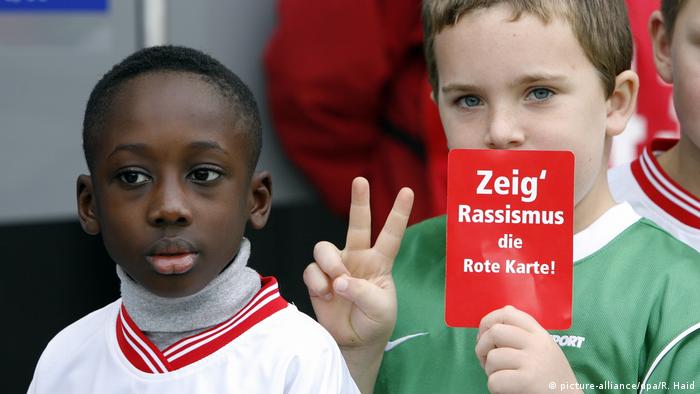The overwhelming majority of Germans are committed to democracy – but to what? Equal rights for all, and pluralism, not for everyone, is the current “mid-study”.

It is less of the hard right-wing extremism as a single right-wing populist attitudes, which the authors of the current “mid-study” warn. Accordingly, the share of German nationals is a closed extreme right-wing view of the world for several years, constant for two and a half percent. The rejection or devaluation of certain groups of the population, on the other hand, the Belief in conspiracy theories, or the deferred endorsement of autocratic forms of government were by no means marginal phenomena, stresses Franziska Schröter of the Friedrich-Ebert-Stiftung (FES): “a Single extreme-right attitudes and right-wing populist settings, have a firm place in German society.”
Since 2006, the FES, the party Foundation of the German social Democrats (SPD) asked the German people to right sentiments. Since 2014, she linked their findings with those of the long-term study “group-focused enmity” of the Institute for Interdisciplinary conflict and violence research (IKG) – raise the researchers from the University of Bielefeld their data since 2002. About every two years, the results appear to be in the “mid-study”.
Right-wing populism – not a new phenomenon
For the current Version, it says in the presentation, respondents to the researchers between September 2018 and February 2019, by telephone, in 1890, a representative sample of Germans aged between 18 and 97 years. The questionnaire follows in most points since 2002-established pattern.
Thus, a development of the other, show that the dissemination of right-wing populism – is contrary to popular perception – by no means a new phenomenon in Germany. In part, the study suggests the findings even on the contrary: at that Time, one in eight Respondents confirmed the General racist attitudes, 2018/19, it was still a 14. The Muslim hostility was in 2006, with about 30 percent much more widespread than the last, with 18.7 percent. Classic anti-Semitism, and xenophobic theses found in the case of the respondents during the 2000s is about twice as large consent as in recent studies.
Devaluation of asylum seekers solidifies
The controversial term “xenophobia,” explains Schröter, use in the absence of a better Alternative: “We know that we ascribe to be Concerned this kind of strangeness.” The experience of the long-term study show, says Schröter, that you face no perception, but rather descriptive. Was meant the hostility that a person has for another because of perceived foreignness.
Significantly, only one value has risen in the last few years, in the spectrum of right-wing populism: The “devaluation of asylum seekers” rose, for the third Time in a row, from 44.3 percent in 2014 to 54 percent. The respondents disagreed that the state should be in the asylum procedure to be generous and found that most of the asylum seekers had no fear of persecution. “It has surprised us to the extent that the number of new asylum applications has fallen since 2016,” says the FES officer.
Right East, left West.
Especially pronounced such attitudes in East Germany. Thus, the “mid-study” confirmed the widespread perception that East Germans more frequently, right attitudes, it would be embraced as a West German. The difference is not according to the study, however, as big as the stereotype makes believe. So right – wing extremism-people with the Nazi – crimes trivialize, a right-wing dictatorship wishes and between what is of value and unwertem life-nationwide.

The AfD have also politicized right-wing populists, like their opponents, says FES-officer Franziska Schröter.
Right-wing populist views are to be found in the new Federal States more often, are the authors: While every second West German asylum seekers refuses to do so, two out of three East Germans. 26 out of 100 East Germans and 19 of 100 West German devalued Muslims. “But above all, the sense of collective anger on the immigration in the East with 52 per cent is significantly higher than in the West, with 44 percent”, – stated in the summary of the authors. Trust in German democracy in the new Federal States is lower than in the old. Also, the endorsement of authoritarianism is more likely to be found.
The reasons the authors of the “mid-study”, and especially Franziska Schröter, a whole Chapter devoted to. In 1978, in Dresden and grew up there she has witnessed the born of euphoria and disappointment about the reunion first hand. Of the violations of the post-reunification years, through a different knowledge understanding of democracy up to the present Situation in structurally weak regions, there is a huge range of explanatory approaches, she says.
Believe in conspiracy theories
Structure-weak regions, however, there is also to the West of the Republic. And also, since the respondents expressed a considerable lack of trust in democracy and its institutions: Almost half of the respondents think, apparently, that there are secret organizations that influence political decisions. Around a third does not feel properly represented, evaluates democratic decisions as a “rotten compromise,” and that “The government is concealing from the population the truth.” Almost a quarter of senses politics and the media “under a blanket”.

Civil society against right-wing populism: sports clubs set
If so many Germans think bad about certain groups of the population, as well as civil and political institutions, the policy is undermined and the media for corrupt hold on – how can it be then, that at the same time, 86 percent of respondents consider democracy the only alternative, and 93 percent of them Dignity and equality of the people in the first place? “Part of the population is the own values,” says study author William Berghan from the University of Bielefeld.
At the end of their summary, the authors themselves put at least a question mark behind the alarming title of the study “Lost middle – hostile conditions”. Because in addition to the “stability of many anti-democratic attitudes in the middle,” there is also positive findings, such as a “strong civil society orientation”. New rights movements challenged this on a hard sample. In order to pass, three things are crucial: More democracy in education, more intensive measures to counteract prejudices, and finally against the people and democracy should not be belittled, in disregard of the opinions of longer, stress the authors.